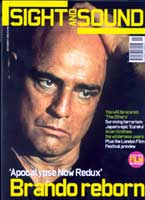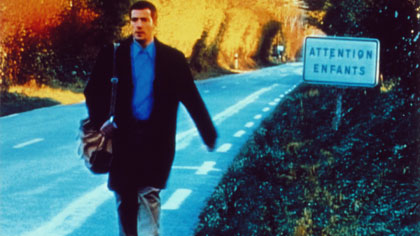
Loving the Enemy
Film of the Month: Éloge de l'amour

Why the new Godard will surprise the UK. By Keith Reader
Éloge de l'amour is Godard's first feature to receive UK distribution since the spectacularly unsuccessful King Lear 14 years ago - probably in part thanks to the recent upsurge of interest in his work by way of a major retrospective at the NFT in London and a conference at Tate Modern focusing on the more recent, largely unavailable material. It is not likely to prove an easy film for a UK arthouse audience for two reasons. Godard's film-making during the period of his prolonged absence from UK screens has become increasingly intense and compacted, at times almost threatening sensory overload through its density of visual and verbal information. Thus it may not be readily apparent that the second segment of the film, which focuses on the attempt by an elderly couple who fought in the Resistance to sell their story to Hollywood, in fact takes place two or three years before the first, which centres on discussions about an artistic project entitled Éloge de l'amour - possibly a film, possibly not - between Edgar (Bruno Putzulu), the work's author, and its backers. Or that the same character, Berthe (Cécile Camp), provides the crucial bridge between the two. Godard here has less abandoned linear narrative, as in so much of his work from Le Gai Savoir (1968), than made it one among a number of polyphonic elements in his text, in the late-modernist vein of a Joyce or a Schoenberg. Éloge de l'amour is far from his most difficult work in this regard, but for audiences more used to the wisecracking mode of, say, Breathless (À bout de souffle, 1960) it will pose a challenge, for all its undoubted wit.
Second, the film is shot through with allusions to recent French history and culture - most obviously to the Resistance and cinema, but reaching into other areas too. An example: Edgar speaks about how it is impossible to think of one thing without also thinking of another, to see one landscape without also seeing another, while facing a river scene as a 30s song is heard on the soundtrack. The river scene is located in Auteuil, one of the most historic and upmarket of Parisian suburbs; the song is taken from Jean Vigo's L'Atalante (1934), set on an altogether more workaday stretch of river. Without these cultural references, much of the sequence's import may escape the spectator.
A crucial set of references on which the film depends is to the Resistance - almost the only period of recent French history Godard has not alluded to in his work (other than indirectly in Les Carabiniers, 1963). This may remind us that the Maoism with which Godard was aligned during its late-60s/early-70s heyday drew an explicit analogy between occupied wartime France and a post-war France colonised by capitalism, calling precisely for 'resistance' to the domination of the latter. Godard's work, particularly from 1968 on, has been characterised by a consistent though protean resistance to the institutions that dominate the circulation of moving images. Commissioned by the French state broadcasting network, he responded with work (such as Le Gai Savoir) they indignantly refused to broadcast; with Anne-Marie Miéville he escaped the spreading tentacles of Hollywoodisation to work on video in Grenoble in the 70s; his earlier film-making self or alter ego is chillingly parodied, as though by way of palinode, in Prénom Carmen (1983). The resistance to Hollywood that is one of the film's most significant strands finds echoes then in Godard's earlier work.
One repeated statement in the film is 'There can be no resistance without memory' - a clear allusion to the 'Vichy syndrome', diagnosed by the historian Henry Rousso, which has obsessively generated texts reproducing or analysing the années noires, from Louis Malle's Lacombe Lucien (1974) to Jacques Audiard's Un Héros très discret (1996). Memory, for Godard, has never been a straightforward given, complicated as it endlessly is by the questions of betrayal and representation. The former, all but omnipresent in his work from the American Patricia's denunciation of Michel in Breathless, becomes inescapable in Éloge de l'amour through the revelation at the end from the historian (played by de Gaulle's biographer Jean Lacouture) about the old couple's past. The latter is most famously crystallised in Godard's aphorism 'It's not a just image, it's just an image' - reprised in slightly altered form here - and is incessantly at work throughout Éloge de l'amour in the discussions around film-making and artistic production, as well as in the film's visual texture. It is not only the industry, but also its audiences that have been in thrall to Hollywood (something recognised by Wim Wenders in his 1976 Kings of the Road when he has one character say, 'The Americans have colonised our subconscious'). Godard's practice, as the inclusion of Hollywood in the narrative of Éloge de l'amour indicates, is at once alternative and oppositional, knowing its enemy and working with playful intensity against it. If that makes the film difficult to watch, he might say, so much the better. Godard has been a foe of the uncomplicatedly consumable image right from the start.
It is a measure of the film's conceptual density that I have managed to write three-quarters of a review without alluding to that visual texture, or rather textures. The first two-thirds of Éloge de l'amour are shot on celluloid in black and white, like a homage to a dying medium; the last third is on video in gorgeous, heavily saturated colour. This contrast, echoing and replicating others (Paris/ Brittany, the future/the past) gives overall structure to what may at first appear a confusing set of anecdotes, aphorisms and micro-narratives - Godardian montage at its most sublimely and irritatingly suggestive. From Bresson to Spielberg, Ophuls to Vigo, Godard to Godard, the film abounds in the kind of intertextual allusions that make up the director's Histoire(s) du cinéma. The performances are fresh and uninhibited - certainly more so than those of Alain Delon and Gérard Depardieu in two of the recent 'missing Godards', Nouvelle Vague (1990) and Hélas pour moi (1993).
Éloge de l'amour is its director's most substantial feature for some time, and even those irked by the film's elusiveness are likely to be entertained by the criticism of the State for its inability to fall in love or the sight of two children in local costume calling at a house with a petition demanding that The Matrix be dubbed into Breton. Even Breathless, we should remember, puzzled many of its first spectators.
